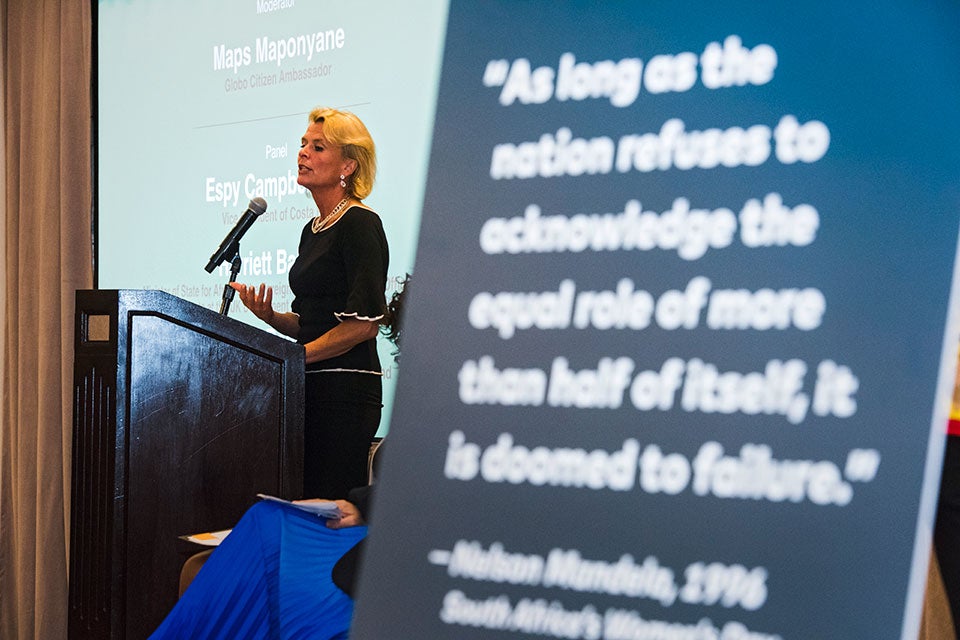Remarks by Deputy Executive Director Åsa Regnér at She Is Equal: Levelling the Law for Women and Girls by 2030
Opening remarks by Assistant Secretary-General of the United Nations and Deputy Executive Director of UN Women at a UN High-Level Panel on Women’s Economic Empowerment reception hosted by UN Women, Global Citizen and Group of Champions for Women’s Economic Empowerment, on the margins of the 73rd UN General AssemblyDate:

[Check against delivery]
Excellencies, distinguished delegates, dear friends,
I thank H.E. Ms. Epsy Campbell Barr, Vice President of Costa Rica and H.E. Ms. Harriet Baldwin, Minister of State at the Foreign Office of the UK for their insightful keynote remarks.
I also thank the Group of Champions for Women’s Economic Empowerment and Global Citizen for co-sponsoring this event with UN Women, and for their continued commitment in accelerating change to achieve gender equality and realize human rights for all.
Women’s economic empowerment is an essential enabler of the full enjoyment of their human rights and labour market participation. It encompasses five dimensions:
- equal rights and access to decent work, social protection, economic resources, and entrepreneurship opportunities;
- equalaccess to ownership and control over land and other forms of property;
- equalaccess to financial services, inheritance, and natural resources;
- solidarity in child / elderly care; and
- right to decide over their own body and their own destiny.
For women, economic empowerment means achieving economic autonomy, meeting their own needs, taking leadership opportunities. It also means that their contributions to the economy—both through paid and unpaid work—are fully recognized and valued.
But beyond the individual level, women’s economic empowerment is critical for the elimination of poverty as well as to speed up sustainable economic growth and to achieve sustainable development.
However, women continue to face discriminatory laws, norms, standards and practices.
In some countries, laws, policies and regulations constrain women’s legal capacity to sign a contract, register a business or open a bank account.
Laws in 104 countries bar women from working in certain jobs, in areas such as mining, manufacturing, construction, energy, agriculture, water and transportation.
In 59 countries women are not legally protected against sexual harassment in the workplace.
These legal restrictions negatively affect the choices and opportunities of more than 2.7 billion women worldwide. They include labor-market segmentation, and gender asset gaps, which compounded by other multiple and intersecting inequalities, result in many overlapping areas of marginalization for many women.
In this regard, eliminating discriminatory laws is an essential step towards accelerating women’s economic empowerment which could be achieved through:
- Creating an enabling environment for women to access decent employment and entrepreneurship opportunities, through for example applying core labor standards and investing in creating and promoting decent jobs;
- Creating or enforcing laws that ensure labour rights and protection for workers in sectors that are dominated by women, such as social protection for domestic workers;
- Ensuring that gender-responsive laws on inheritance and property rights are in place everywhere; and
- Securing laws that recognize the value of women’s disproportionate share of unpaid care and domestic work, and establish the means to reduce and redistribute it, such as paid maternity and parental leave.
UN Women is supporting countries to repeal laws that undermine women’s economic empowerment. For example: UN Women has supported governments in amending the labour laws so to include equal pay for equal work provisions. These amendments may result in state institutions being requested to incorporate the principle of equal opportunities in strategic plans and budgets, and track impacts on women and men, including through collecting sex-disaggregated data. Also, this kind of measure may generate the opportunity for gender equality training to become available for public employees thus contributing to raising awareness of labour rights at work.
The 2030 Agenda’s principle of ‘leave no one behind’ demands that we must direct our efforts to the most marginalized women. In this effort we must remember that all issues of gender equality and the law are intrinsically linked:
- Laws which guarantee girls’ access to education increase their economic opportunities.
- Laws which prohibit child marriage and female genital mutilation increase the likelihood of young girls staying in school.
- Laws which align with international human rights standards and protect women from violence and sexual harassment, and criminalize such offences, increase women’s safety in the workplace.
Let me recognize that the Secretary-General’s High-Level Panel on Women’s Economic Empowerment marked a turning point in the global discourse on gender equality and women’s economic empowerment, and made a series of crucial recommendations on closing pervasive gender gaps, including in the law.
UN Women commends the Group of Champions for Women’s Economic Empowerment for continuing the work of the High-Level Panel and its commitment to implementing its recommendations.
We look forward to an exciting discussion on bold and innovative ideas to remove the legal barriers to women’s economic empowerment. And to discussing synergies for our renewed efforts and partnerships.
Thank you.